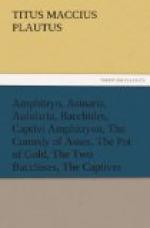For you see, Amphitryon, will be raging at his wife shortly, and accusing her of playing him false: then my father will step in and quell the riot. Now about Alcmena—something I left unsaid a while ago—now she shall bring forth twin sons,
alter decumo post mense nascetur puer quam seminatust, alter mense septumo; eorum Amphitruonis alter est, alter Iovis: verum minori puero maior est pater, minor maiori. iamne hoc scitis quid siet?
one being a ten months’ boy, the other a seven. One is Amphitryon’s child, the other Jove’s: the younger boy, however, has the greater father, and vice versa. You see how it is now, do you?
sed Alcumenae huius honoris gratia pater curavit uno ut fetu fieret, uno ut labore absolvat aerumnas duas[15]. (488) quamquam, ut iam dudum dixi, resciscet tamen 49l Amphitruo rem omnem. quid igitur? nemo id probro profecto ducet Alcumenae; nam deum non par videtur facere, delictum suom suamque ut culpam expetere in mortalem ut sinat.
But out of consideration for Alcmena here, my father has provided that there shall be only one parturition: he intends to make one labour suffice for two. But Amphitryon, though, as I told you some time since, will be informed of the whole affair. But what of that? Certainly no one will hold Alcmena guilty: no, no, it would seem highly unbecoming for a god to let a mortal take the consequences of his misdeeds and his indiscretions.
orationem comprimam: crepuit foris.
Amphitruo subditivos eccum exit foras
cum Alcumena uxore usuraria.
(listening)
Enough of this: there goes the door. Ah,
the
counterfeit Amphitryon
comes out with his borrowed wife,
Alcmena! (steps
aside)
I. 3.
Scene 3.
ENTER Jupiter AND Alcmena FROM THE HOUSE.
Iup.
Jup.
Bene vale, Alcumena, cura rem communem,
quod facis;
atque inperce quaeso: menses iam
tibi esse actos vides. 500
mihi necesse est ire hinc; verum quod
erit natum tollito.
Good-bye and God bless you, my dear. Continue to look out for our common interests, and do be sure not to overdo: you are near your time now, you know. I am obliged to leave you—but don’t expose the child.
Alc.
Quid istuc est, mi vir, negoti, quod tu tam subito domo abeas?
(plaintively)
Why, my husband, what is it takes you away
so suddenly?
Iup.
Jup.
Edepol haud quod tui me neque domi distaedeat;
sed ubi summus imperator non adest ad
exercitum,
citius quod non facto est usus fit quam
quod facto est opus.
No weariness of
you and home, I swear to that. But when the
commander-in-chief
is not with his army, things are much
more liable to
go wrong than right.




